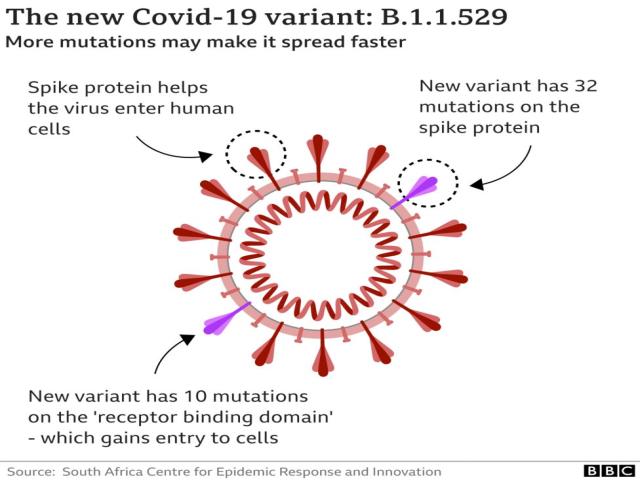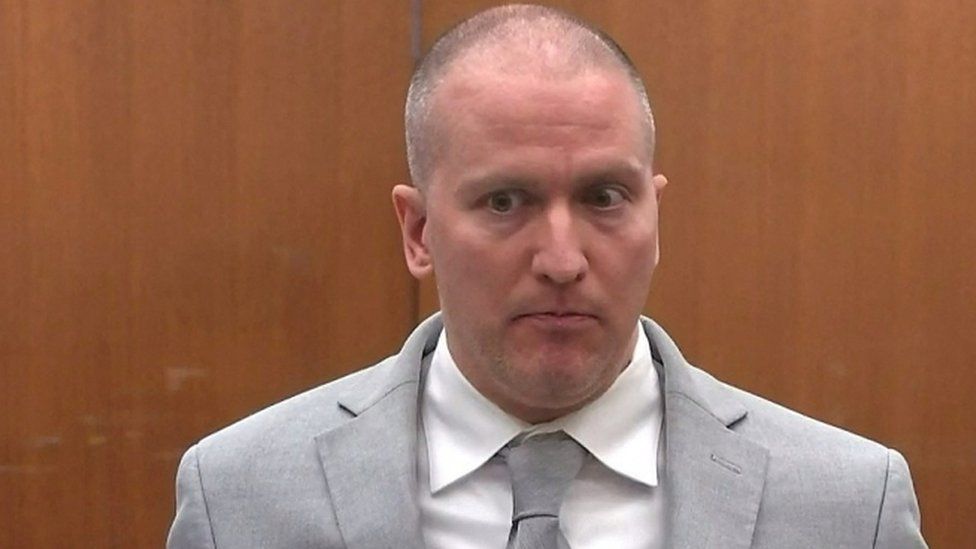Covid: Two cases of new variant Omicron detected in UK

Sajid Javid said the UK Health Security Agency had detected cases in Brentwood, Essex, and in Nottingham.
He said the cases were linked to travel in southern Africa and they and their households were self-isolating as more tests and contact tracing take place.
The new variant has also been identified in South Africa, Botswana, Belgium, Hong Kong and Israel.
Prime Minister Boris Johnson will be holding a press conference at Downing Street later with the chief scientific advisor to the government, Sir Patrick Vallance, and the UK's chief medical officer Prof Chris Whitty.
How worrying is the new Covid variant?
Do we need new vaccines yet?
New Covid variant not a disaster - Sage scientist
South Africans fear impact of new variant measures
The new Omicron variant was first reported to the World Health Organization from South Africa on Wednesday.
Countries around the world are currently racing to introduce travel bans and restrictions on southern African countries in an effort to contain Omicron's spread.
Ten countries are now on the UK's travel red list meaning, from Sunday at 04:00 GMT, all arrivals will have to quarantine in a hotel for 10 days.
On Friday, the UK placed South Africa, Namibia, Zimbabwe, Botswana, Lesotho and Eswatini on the list.
In his announcement on Saturday, the health secretary said Angola, Mozambique, Malawi and Zambia would be added.
Mr Javid said: "If anyone has travelled to these four countries or any of the other red-listed countries in the last four days then they must self isolate and take PCR tests."
"Today I can announce one thing that we are doing immediately is carrying out targeted testing and sequencing of positive cases in the two areas that are affected."
The Department of Health says testing is being carried out at locations where the positive cases were likely to have been infectious.
"Confirmed cases and contacts are being followed up and requested to isolate and get tested as necessary," it said.
Presentational grey line
Analysis box by James Gallagher, health and science correspondent
A "variant of concern" is the World Health Organization's top category of worrying Covid variants.
The decision adds weight to the mounting scientific worry about the potential of this new variant, but it doesn't change any of the facts.
The variant has an astounding collection of mutations which are thought to increase its ability to spread and bypass some, but not all, of the protection from vaccines.
However, we still don't have the clear real-world data.
We don't know for sure that it spreads faster, makes vaccines or drugs less effective or whether it leads to more severe disease.
Presentational grey line
The health secretary said the UK vaccine rollout programme was now "even more important".
"We know there's this new variant out there. We don't know enough about it yet but from what we do know, the protections that we have - especially the vaccines - are hugely important," he said.
Asked about potential changes in Covid restrictions, Mr Javid said: "We will do whatever is necessary to protect the progress we have made as a country. We've come a long way since the summer and we keep all of this under review and if we need to take further action, we will."
The chief medical officer said the UK would be working closely with the international community to understand any possible increase in transmissibility or resistance to vaccines.
Prof Whitty said: "It is important that everyone takes sensible precautions - get a PCR test if you have symptoms, isolate when asked, wear a face covering in crowded and enclosed spaces, ventilate rooms, get your vaccine and boosters as soon as you can."
Sajid Javid said the UK Health Security Agency had detected cases in Brentwood, Essex, and in Nottingham.
He said the cases were linked to travel in southern Africa and they and their households were self-isolating as more tests and contact tracing take place.
The new variant has also been identified in South Africa, Botswana, Belgium, Hong Kong and Israel.
Prime Minister Boris Johnson will be holding a press conference at Downing Street later with the chief scientific advisor to the government, Sir Patrick Vallance, and the UK's chief medical officer Prof Chris Whitty.
How worrying is the new Covid variant?
Do we need new vaccines yet?
New Covid variant not a disaster - Sage scientist
South Africans fear impact of new variant measures
The new Omicron variant was first reported to the World Health Organization from South Africa on Wednesday.
Countries around the world are currently racing to introduce travel bans and restrictions on southern African countries in an effort to contain Omicron's spread.
Ten countries are now on the UK's travel red list meaning, from Sunday at 04:00 GMT, all arrivals will have to quarantine in a hotel for 10 days.
On Friday, the UK placed South Africa, Namibia, Zimbabwe, Botswana, Lesotho and Eswatini on the list.
In his announcement on Saturday, the health secretary said Angola, Mozambique, Malawi and Zambia would be added.
He said: "We've always been very clear that we won't hesitate to take further action if that is what is required.
"Today I can announce one thing that we are doing immediately is carrying out targeted testing and sequencing of positive cases in the two areas that are affected."
The Department of Health says testing is being carried out at locations where the positive cases were likely to have been infectious.
"Confirmed cases and contacts are being followed up and requested to isolate and get tested as necessary," it said.
Presentational grey line
Analysis box by James Gallagher, health and science correspondent
A "variant of concern" is the World Health Organization's top category of worrying Covid variants.
The decision adds weight to the mounting scientific worry about the potential of this new variant, but it doesn't change any of the facts.
The variant has an astounding collection of mutations which are thought to increase its ability to spread and bypass some, but not all, of the protection from vaccines.
However, we still don't have the clear real-world data.
We don't know for sure that it spreads faster, makes vaccines or drugs less effective or whether it leads to more severe disease.
Presentational grey line
The health secretary said the UK vaccine rollout programme was now "even more important".
"We know there's this new variant out there. We don't know enough about it yet but from what we do know, the protections that we have - especially the vaccines - are hugely important," he said.
Asked about potential changes in Covid restrictions, Mr Javid said: "We will do whatever is necessary to protect the progress we have made as a country. We've come a long way since the summer and we keep all of this under review and if we need to take further action, we will."
The chief medical officer said the UK would be working closely with the international community to understand any possible increase in transmissibility or resistance to vaccines.
Prof Whitty said: "It is important that everyone takes sensible precautions - get a PCR test if you have symptoms, isolate when asked, wear a face covering in crowded and enclosed spaces, ventilate rooms, get your vaccine and boosters as soon as you can."

Myanmar military reverts to strategy of massacres, burnings
- When the young farmhand returned to his village in Myanmar, he found the still smoldering corpses in a circle in a burned-out hut

Derek Chauvin pleads guilty in George Floyd civil rights case
- Former Minneapolis Police Officer Derek Chauvin has pleaded guilty to federal charges of violating George Floyds civil rights.

Putin to mull options if West refuses guarantees on Ukraine
- Russian President Vladimir Putin said Sunday he would ponder a slew of options if the West fails to meet his push for security guarantees.

The travelers who are turning their backs on airplanes
- The travelers who are turning their backs on airplanesThe travelers who are turning their backs on airplanes